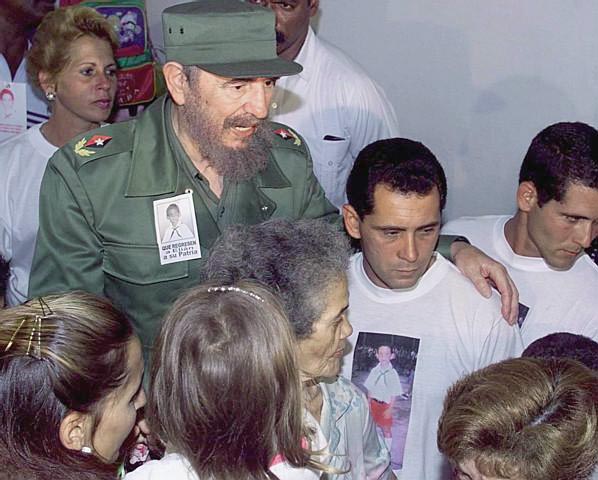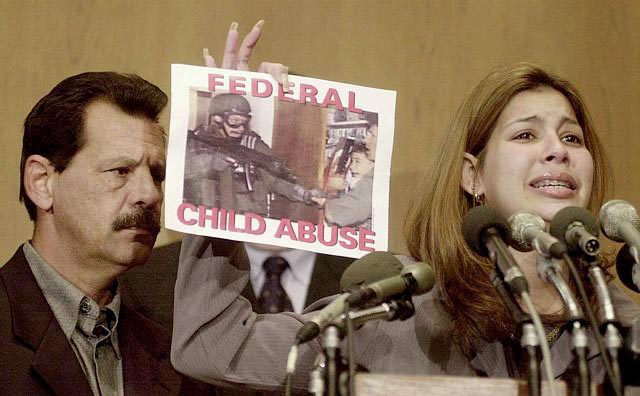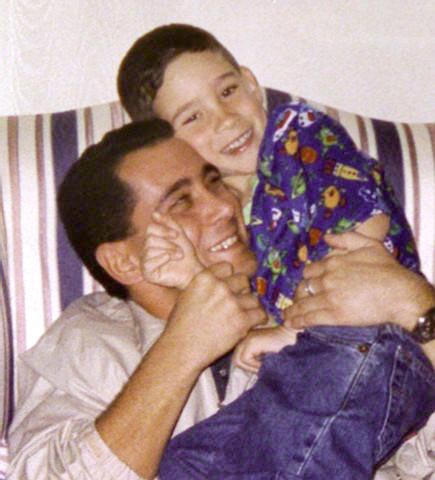
"This was a continuation of
the Cuban missile crisis,
with a six-year-old boy substituting for
the warheads."
© AFP/Corbis

Fidel Castro, arm around Juan Miguel, meets the media.
"The Miami exiles actually made Fidel Castro look
like the family-values guy! "

"I credit Marisleysis for one of the most chilling and Orwellian moments of the whole drama . After Elian's bizarre visit with his Cuban grandmothers on Miami Beach, she told reporters, "Did you see the way he rejected his grandmothers? He's on our side now."
All the news is not negative. Elian's saga allowed Cuba to see us--and allowed us to see Cuba--through the eyes of people besides Castro and the Miami exiles. That is already bringing some long-needed sanity to U.S.-Cuba relations.
Tim Padgett
is the Miami Bureau Chief for Time magazine and can be reached by e-mail:
Tim_Padgett@timemagazine.com
Magazine
Winter/Spring 2001
Tearing
at 
a Sacred Bond
On
Thanksgiving Day 1999, Elian Gonzalez was rescued off the coast of Florida
after the boat carrying his mother and 12 others sank in the Atlantic.
For the next seven months, Fidel Castro and Cuban exiles in Miami pulled
at the relationship between the six-year-old Cuban boy and his father,
Juan Miguel, like dogs ©Reuters
Newmedia Inc./CORBIS
at a wishbone.
Time magazine's lead correspondent on the Elian Gonzalez tragedy
offers a close-up of the people involved, their motivations, and some
hopeful lessons learned from the debacle.
by Tim Padgett '84
excerpted from a speech to
the Indianapolis Bar Association
The Elian Gonzalez tragedy was one of those stories that left everyone
it touched with an odor fouler than the humid summer days I used to spend
in the Indianapolis Stockyards with my grandfather.
When Time ran its first big cover story on Elian, our New York
offices called me for some of my impressions of the whole mess. When the
magazine came out, I couldn't believe I'd actually said what I saw in
print. "It's been painful as a father as well as a journalist to watch
Elian have to endure this interruption in his blossoming," I said. "Elian
kind of reminds me of my boy in many ways."
As I read, I wondered how a red-blooded, cynical reporter like me had started to sound like Peter, Paul & Mary! At the time, I was starting treatment for clinical depression (Tipper Gore says it's okay to talk about it) and I asked my doctor if his therapy was turning me into a folksinger.He said, "Now, now, Tim, as a father you're bound to identify with all of this." And I said, "No! No! I'd rather be a depressed journalist than be a happy Geraldo Rivera!"
In retrospect, he was right: any father could identify with what was happening to Elian and his father, Juan Miguel. That made it more important than ever for me to detach myself if I wanted to capture this story clearly, correctly, and responsibly. I resolved that my long-term coverage of Elian wasn't going to sound like the Oprah Winfrey Show. Sure, Elian was adorable and and everybody wanted to know whether he preferred Pokemon to Power Rangers. But what was too often missing in the media's coverage was an examination of the ugly forces that were driving the story-forces that told us things about our country as well as the plight of a little boy. Fortunately, I work for very good editors, and they felt the same way: we couldn't tell the story of this little lamb without telling the story of the wolves.
A decade after the Cold War had ended, we Americans had arrogantly fooled ourselves into believing that we had rendered ideology obsolete. We've discovered through the Elian saga, and through episodes like President Clinton's impeachment, that ideology-both left-wing and right-wing-can still rear its boorish head and pollute our civics. In the case of Elian Gonzalez, it polluted one of the most precious chambers: the law.
The lawyer journalists whom hold most responsible for the tragedy was the highest lawyer in the land: Attorney General and Miami native Janet Reno. Reno's utter cluelessness about the forces she was dealing with in this case resulted in a seven-month-long debacle that should have lasted no more than a month. The shameful national spectacle of Elian happened chiefly because Janet Reno and Bill Clinton allowed it to happen.
The first and most critical mistake Reno made was to think that this was a custody battle between two families. It was instead a battle between Havana and Miami, between the communist dictator Fidel Castro and the right-wing Cuban exiles-many of whom were responsible for the repressive Batista dictatorship that helped bring about the repressive Castro dictatorship. In short, it was a continuation of the Cuban missile crisis, with a six-year-old boy substituting for the warheads.
Castro and the exiles share a deep resentment of how the post-Cold War world has diminished their political influence--the attention they used to enjoy. Cuban leaders, in Havana or Miami, have a tendency to think that the fate of the Western hemisphere rests on the fate of Cuba. Their quarrels often become vicious crusades, with each side pursuing its cause regardless of cost, even if that means effectively snatching Elian, as the exiles did; or holding his father hostage in Cuba for four months, which is essentially what Castro did.
Castro and the Miami exile leadership needed to hear a strong message from the media: "a pox on both your houses, because both of you are trashing the sanctity of the most basic human bond there is."
Not that such a message would have shamed either side into responsible behavior. Castro and Miami's exile leadership needed this fight over Elian, as one Cuban moderate told me, "the way you and I need oxygen."
Fidel needed something to light that revolutionary Cohiba cigar ash again-a fresh anti-Yankee crusade to shore up his flaccid stature and reignite his people's paranoia of U.S., which is where his power has always resided. What he needed was El Secuestro de Elian! The Kidnapping of Elian! And he could get away with it because the Miami exiles actually made Fidel Castro look like the family-values guy!
Miami's Cuban exiles were equally desperate. They had virtually built modern Miami and had established themselves as one of the most successful immigrant groups in U.S. history. They were also the most privileged refugee group in America, by virtue of their special anti-Castro status. This mix of privilege and hard immigrant effort helped Miami's Cuban-Americans create one of the most potent local political machines in America, the Cuban American National Foundation-a tropical Tammany Hall. In Miami, hardly a judge is elected, a contract awarded, or a word uttered in the Spanish-language media without the approval of the Foundation.
But by autumn of 1999, the Foundation was beginning to feel its own post-Cold War irrelevance. In fact, I'm told, just days before Elian landed in Florida, leaders held a meeting in which they racked their brains trying to figure out how to reverse the growing anti-embargo movement in Washington.
And then, like the answer to a seance, Elian dropped into their laps.
Under the law, Elian should have been attended to medically and psychologically,
and then, once it was determined that he had a father in Cuba who wanted
him returned, he should have been put on a plane back. But that's not
what happened. That's because a few months earlier, the feds had gotten
into a lot of trouble when they used pepper spray and water cannons trying
to intercept a group of Cuban rafters off Miami Beach. The scene was broadcast
live in Miami and sparked protests that stopped the city's traffic for
an entire day. Janet Reno had to make a televised apology to the Cuban
exiles.
After that public relations disaster, there was no way the Immigration
& Naturalization Service was going to send an adorable, white six-year-old
back to Cuba, where milk is rationed. So they gave Elian to his great-uncle
Lazaro Gonzalez, who only had to show the INS a picture of himself with
Elian from a recent visit to Cuba in order to get custody of the boy.
One thing that's not widely known about this story is how the Cuban American National Foundation was able to assemble such a large army of pro-bono lawyers. That job fell to Armando Gutierrez, one of the Foundation's most notorious slash-and-burn political operatives.
Armando assembled his team, turning first to Spencer Eig, a failed politician who needed to build his bridges with Miami's Cuban community if he was going to have any political future.Armando offered Spencer the chance to do that. Pro bono, of course.
Then there was Kendall Coffey, the former U.S. Attorney who had resigned his post after biting a stripper in a Miami club. Armando called on his services as well.
Jose Garcia Pedrosa, another member of the team, gave me one of my more astonishing on-the-record quotes: "Which kind of family is a less important factor in this how this boy should be raised than which kind of state." The team's mandate from the Foundation was simple: make this case drag out for as long as possible--or until we achieve martyrdom by forcing the federal government to rip Elian from our freedom-loving hands. Foundation chairman Jorge Mas Santos told me in one interview that he wanted to use Elian's case "to provoke Castro as long as we can, to make the world see the hopeless reality of repression in Cuba."
The Foundation lawyers wanted us to see this as a custody case so they could get it into state family court, where they could manipulate the judges. But in order to argue that the Miami relatives should have custody, they first had to argue that Elian should be granted U.S. political asylum--a federal immigration issue over which the INS had clear jurisdiction.
The INS had no alternative but to determine that Juan Miguel Gonzalez, despite being a communist and Castro-ite, was a fit, involved, and loving father who had to be the boy's legal spokesman on immigration decisions. This was the paradox that I had already determined for myself--not only was Juan Miguel a devoted father, but he was also a devoted communist. I could tell he was a good father, for example, by the spontaneous way he described to me on the phone how worried he'd been when Elian once had to have a rectal polyp removed. I could tell he was a loyal Castro-ite by the way he expressed his belief, for example, that Cuba's admittedly strong education system would be better for Elian. Remember that even though two-thirds of Cubans want to get off the island, Cuba experts estimate that there is another third who are still Castro believers. Juan Miguel, to the best of my human and journalistic judgment, is one of them.
Maybe it was an act; maybe Juan Miguel actually knew about the boat trip and had wanted Elian and his mother to make it to U.S. soil. Maybe he fooled us all. But in the end, that's not the point: the point is, the man wanted his son, and that's not a political issue.
Janet Reno allowed the Cuban exiles to make it one. After New Year's Day, after the INS decided to return Elian by January 15, it should have been over. But, incredibly, Reno let the decision slide and actually invited the Miami lawyers to challenge her ruling. She traded in her duty as attorney general for a role as family counselor. Granted, she didn't want another Waco on her hands. But if she really knew her hometown, she should have realized that there was no peaceful way out of this.
The statutory ambiguity at issue in Elian's case was a line in our ever-muddled U.S. immigration law that says "any alien" on U.S. soil has the right to apply for political asylum. Here, the Justice Department interpreted this clause not to include small children. The Miami lawyers argued that "any alien" included a six-year-old. The federal district court in Miami ruled in favor of the Justice Department, and the Miami crowd appealed to the 11th Circuit Court of Appeals in Atlanta. They also rabidly intensified their argument that this boy should have asylum because that's what he wanted.
Then the circus in Little Havana really turned into a grotesque spectacle. U.S. congressmen, including Indiana's Dan Burton, came out of Lazaro's house to tell us that they'd just met with Elian. They'd discussed everything with him from the Federalist Papers to 401-K plans and, by God, that boy wants to live here.
Diane Sawyer wanted an interview with Elian so badly that she all but cast ethics to the wind and agreed to Armando Gutierrez's demand that ABC broadcast the boy saying he didn't want to go back to Cuba. Armando then released the obscene video of Elian coached to rebuke his father.
About this time, Lazaro's daughter, Marisleysis, became the Foundation's most formidable asset. But if there was one truly Machiavellian member of that family, it was Marisleysis, Elian's self-appointed surrogate mother. I admire the way she took care of Elian after he'd lost his mother in such awful circumstances, but family relatives in Miami I spoke with described to me how her orders from the exile leadership were not to turn Elian directly against his father, but to do that indirectly by turning the boy against Cuba.
Milk is rationed in Cuba and chocolate milk is an outright luxury there. Elian fell in love with it as soon as he moved into Lazaro's house. So every time Marisleysis made it for him, a family source once told me, she'd stroke his face and say something like, "Remember, Eliancito, your grandmothers can't make this for you in Cuba." I also credit Marisleysis for one of the most chilling and Orwellian moments of the whole drama, when, after Elian's bizarre visit with his Cuban grandmothers on Miami Beach, she told reporters, "Did you see the way he rejected his grandmothers? He's on our side now."
Little Havana had become a madhouse. Then the United Methodists' national council on church and society, whose leaders had been acting as a secret conduit between Castro and Reno, got involved. They realized that the Miami exiles were never going to give this boy up, and that Castro was never going to let Juan Miguel come to the U.S. to get him. They had to convince Fidel to change his mind, and the lawyer they got to do it was Beltway powerhouse and Clinton buddy Gregory Craig.
Craig knew that Reno was fed up with the Miami crowd, and that going in and getting Elian by force would be politically easier if his father were on U.S. soil to claim him. He knew that Castro was a master poker player, especially when it came to the Miami exiles-who by this point were sure that Fidel would never let Juan Miguel come. Craig believed that Castro knew that this was the perfect time to unleash Juan Miguel.
And so came the famous raid on the house in Little Havana. Don't believe any of this bunk about both sides being close to some deal in the wee hours just before the raid. Lazaro and the exile leadership were never going to hand over that boy. The raid was what they wanted. They actually believed that it would pull America onto their side.
It didn't. So the only chance they had left was the appeals courts. And although the 11th Circuit in Atlanta is one of the nation's most conservative, it also is notoriously anti-immigration and almost always sides with the Justice Department in such cases. In the end, the judicial branch deferred to the executive branch's constitutional discretion to rule that "any alien" did not mean Elian.
Not all the news from the Elian story is negative. As I wrote in my swan song article for Time last summer after Elian returned home, Elian's saga allowed Cuba to see us-and allowed us to see Cuba-through the eyes of people besides Castro and the Miami exiles. That is already bringing some long-needed sanity to U.S.-Cuba relations, evidenced by the limited but nevertheless ground-breaking legislation this past fall to bring down a part of the trade embargo and sell food and medicine to Cuba. I'm no more a fan of Castro's dictatorship than any of you are; but he's not going to live forever, and there is a growing chorus of moderates who argue that we have to start looking beyond Castro if we're going to help the island move toward democracy.
There is one more positive result of Elian's story. During the worst days of the battle last April, when I was working 16-hour days on this story, my son Tomas, then five, came to me one night and said, "Daddy why are you spending so much time with Elian?" What he was asking, of course, was, Why are you spending so much time with that little boy and so little time with me?
It obviously broke my heart. Someday when he's older--say, when he's old enough to understand what political asylum means--I'll tell him why reporters and dads like me got so involved in this story and were determined to get it right. It's because we knew we were going to take lessons from it that would make us better fathers, and that those lessons needed to be heard.
Return to the table of contents
